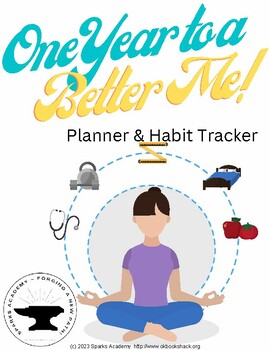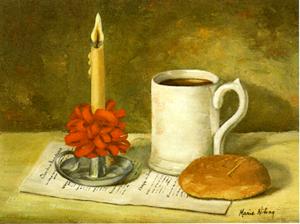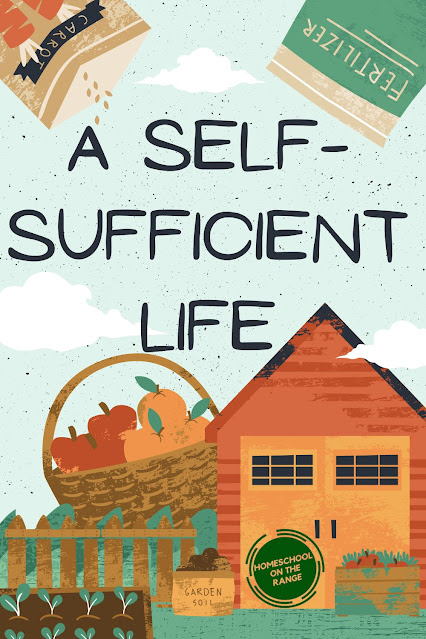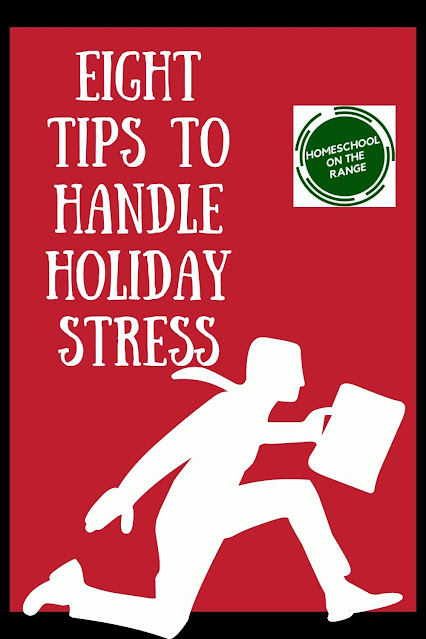Thursday, December 29
Butchering the Hog
Tuesday, December 27
Word of the Year 2023 - Self-Sufficient
Each year, we choose a Word of the Year...something to focus on energies on for the upcoming year. It's akin to the New Year Resolution, but less of an actual task than a change in mindset. For 2023, we selected Self-Sufficiency. While this is something we've been working on for a while, we've decided it's time to put just a little more energy into this goal...
Previous words of the year include:
Homestead Skills

Want to take it a step further, or spruce up your front yard? In Raised Beds & Pallet Planters, you'll get step-by-step instructions for unique planters!
Canning, freezing, and drying -- do you know which is best for each food? Learn to put up your harvest (or bulk buys) in Home Preservation Basics.
At one time, most children learned Basic Outdoor Skills, but now we have to seek opportunities for teaching them. Don't let another year go by without incorporating these simple tasks into your homeschool.
Whether you have a hobby-homestead, are a frugal momma, or just spent a lot of time with the 'Greatest Generation,' re-purposing is a simple fact of life. Use it up, wear it out, make it do, or do without! These Repurposing Ideas for the Homestead will help you to save money, do a little recycling, and even bring a personal flair to your home!
Immunity is affected by daily habits, lifestyle choices, and exposure to toxins. Your immune system doesn't just help prevent you from catching colds, but also prevents against things like cancer. Maintaining a healthy immune system should be top priority all year long, not just during cold and flu season...learn more in Immune Boosting Herbs.
Animals, outbuildings, pipes...all of these things need tending to and don't just wait for better weather. But be smart about it and follow these tips from Winter Safety on the Homestead. All I can say is, on cold winter days, I'm so glad we don't homestead closer to the Arctic!
Unit Studies (not just for kids!)

The My Side of the Mountain novel study features Sam, runs away to the wilderness to escape his family. He is tested and discovers strength and self-confidence. Today, the Boy Scouts teach survival skills in their Wilderness Survival badge.
Herb studies combine both science and life skills. In The Secret Garden novel study, students learn to start and maintain an herb garden, as well as the uses for each plant.
In the Willa and the Wood novel study, you and your students will learn about foraging for plants and basic herb uses.
Download and print the Farming Book List to incorporate agricultural wisdom into your homeschool. This list includes both fiction and non-fiction books.
Recently, there has been a rise in the popularity of survival-based books for children. Our boys were definitely drawn to these more rough and tumble types of books, but they're not just for boys. Here are some of the Best Kids' Books About Survival.
Eat In Tonight


A Slow-Cooked Year This book includes : the whats and whys behind crockpot cooking, how-to tips and tricks, safe crockpot guidelines, printable planning sheets, and more than thirty seasonally-appropriate, kid-friendly recipes! | Another Year of Freezer Cooking For anyone who wants to get a leg up on getting healthy meals on the family table, without much fuss...this book includes : the whats and whys behind freezer cooking how-to tips and tricks pantry freezing guidelines, printable planning sheets more than thirty seasonally-appropriate, kid-friendly recipes! |
Courses & Resources
 I cannot say enough about the Homestead Education curriculum! Introduction to Homestead Science covers the art and science of homesteading in a full year science curriculum. There is daily reading and vocabulary, additional research projects, hands on projects both short and long term, and applied mathematics. Being an introductory course, there are some topics that are covered more in depth than others.
I cannot say enough about the Homestead Education curriculum! Introduction to Homestead Science covers the art and science of homesteading in a full year science curriculum. There is daily reading and vocabulary, additional research projects, hands on projects both short and long term, and applied mathematics. Being an introductory course, there are some topics that are covered more in depth than others.  One of our favorite courses at SchoolhouseTeachers is the Homesteading course! If you’ve ever wanted to ditch the chemicals in your household cleaners, can what you grow or purchase at a farmer’s market, make your own gifts and candles, or learn how to do things the natural way, you need to see the Homesteading class.
One of our favorite courses at SchoolhouseTeachers is the Homesteading course! If you’ve ever wanted to ditch the chemicals in your household cleaners, can what you grow or purchase at a farmer’s market, make your own gifts and candles, or learn how to do things the natural way, you need to see the Homesteading class.
This ongoing course shares tips and detailed instructions that can enable you and your family to live more simply and naturally. Printables and some how-to videos are included with these weekly lessons...and it's all included with the 350+ other courses offered at SchoolhouseTeachers.com.
- In the Kitchen – Fall & Winter
- In the Kitchen – Spring & Summer
- Around the Homestead – Inside
- Around the Homestead – Outside
The Permaculture Student includes:
- Private Community Facebook Group for Students
- Unlimited Access to the Video Library
- Includes eBook versions of The Permaculture Student 1 textbook & workbook
- Hands-On Projects with Step-by-Step Directions & Video
- Open & self-paced course. Start anytime, take your time & enjoy the design!
- What you will learn:
- Permaculture Design - homes, landscapes, society, businesses & more
- Pattern Literacy
- Reading the Landscape
- Seed-to-Table Cooking
- Earthworks
- Seed Saving
- Composting, Compost Tea, & Extract!
- Food Preservation & Storage

DIY - Do It Yourself

For the price of one bottle of elderberry syrup at the store, you could make ten to fifteen times that amount at home! Homemade Elderberry Syrup is super easy, and anyone can make it.
Organic pecan butter is one of my favorite treats. It's also $18 per teeny-tiny jar. I love to eat well, but I'm also cheap, so here is our recipe for Homemade Pecan Butter.
What's your family's word of the year? We want to know!
Make this year YOUR year! This reusable calendar features monthly at-a-glance pages and weekly pages with space for notes and planning. Each week also has a habit tracker grid to help keep the momentum going with your new habits! Just print and reuse each year for your planner.
Monday, December 5
Sweet Taste of the {Moravian} Holiday Season
 The Moravians were a religious group that left Moravia (present-day Czechoslovakia) and settled in Germany, then started sending missionaries to the New World in the mid-1700s. They came first to Georgia, but ended up in Pennsylvania and North Carolina. Old Salem, founded in 1766, became a trade center where Moravian craftspeople sold their wares.
The Moravians were a religious group that left Moravia (present-day Czechoslovakia) and settled in Germany, then started sending missionaries to the New World in the mid-1700s. They came first to Georgia, but ended up in Pennsylvania and North Carolina. Old Salem, founded in 1766, became a trade center where Moravian craftspeople sold their wares.Spiced Moravian Cookies
Ingredients
- Heat molasses, sugar, and shortening on medium until dissolves together. Stir continuously. Do not boil!
- Remove from heat and cool to lukewarm.
- Sift spices and baking soda to remove lumps, then stir into molasses mixture. (Foam may occur; this is ok) Let mixture cool.
- Add flour into mixture a bit at a time, thoroughly mixing. Cover and store dough overnight in refrigerator.
- Flour a hard surface. Turn out dough and knead until it is shiny and smooth.
- Heat oven to 225 F.
- Pull off a small piece of dough and roll with a rolling pin until it is so thin you can see through it. Cut with cookie cutter, if desired.
- Place onto greased cookie sheet. Repeat with all the dough. Bake 8-10 min.
Love Feast Resources

- Take a virtual tour of Old Salem and pick up another fantastic recipe - for Sugar Cake!
- Outline to host your own Love Feast
- Make Lovefeast Buns
- Craft your own Lovefeast Candles
- An Old Salem Christmas, 1840
- The Old Magic of Christmas
- Learn about the Moravian faith
- Hang the Christmas Star
- Buy the cookies (rather than bake)
Tuesday, November 15
Spread Cheer with these Frugal Homemade Christmas Gifts

Kitchen Crafts
- Fabric items are a hit, whether seasonal or not.
- You can make tie-dye dish towels in the color scheme of your recipient's kitchen, or go with traditional red and green.
- Paint some hand towels with fabric paint - use seasonal or classic kitchen designs.
- Bowl cozies are nice for warming soups in a bowl in the microwave and not burning yourself.
- A few notes:
- You can pick up plain towels in bulk to start this project.
- If you're planning to make anything that will go in the microwave, be sure to use 100% cotton.
- Using cotton and beeswax, it only takes a little bit to put together homemade beeswax food wraps for a fraction of the cost.
- Know how to embroider? Why not create some personalized grilling aprons?
- Heading to a party? Bring a bottle in these cute, seasonal homemade wine bags using old blue jeans.
- If you're handy with a woodburner, create some personalized wooden spoons and spatulas, then add in a potholder and / or cookie mix.
- You could also design a recipe box and put in your favorite recipes!
.jpg)
 Foodie Gifts
Foodie Gifts
.jpg) Self-Care Gifts
Self-Care Gifts
- Essential oils plus some basic kitchen supplies can go a long way! There are MANY different kinds and brands of essential oils to choose from, but outside of the MLM brands, this is one that our family has had good experiences using.
- All of the below suggestions can be dressed up using small jars and a bit of ribbon or twine!
- Mix them with coarse sugar crystals and hand soap for a sugar scrub.
- Combine them with a coarse sea salt for bath salts.
- Put a few drops into some homemade lotion - made by mixing vaseline, baby lotion, and vitamin E.
- Reusable necessities are earth-friendly and chemical-free...for the young women in your life.
- Grab some kitchsy socks and create rice heating pads. This is also good for using up cute (clean) mismatched socks from the laundry room.
- Using bulk elderberries, whip up several bottles of elderberry syrup for a seasonal immune booster.
House & Home Crafts
- Using a simple recipe, you can make cute Christmas shaped bird seed ornaments. They hang outdoors like an ornament, and the birds can enjoy them.
- Here's a simple tutorial video set for using air-dry clay to make a nativity scene!
- Using colored sharpies and / or paints, kids can make personalized doodle magnets.
- Grab some super-cheap paintbrushes to make a Santa Claus decoration they'll love!
- One unique gift idea - that keeps on giving - is the "Open When" envelope series. This includes things such as, "Open when you're going on a road trip"- with a prayer for safe travel, added some gum, and a gas gift card, or "Open when it's snowing!" with a packet of hot chocolate and paper snowflakes. Here are 150 ideas for what to put inside your envelopes.

 Holiday Schooling & Home Economics
Holiday Schooling & Home Economics
- The holidays are a great time to get a lesson in on Budgeting and Shopping with a Budget!
- When the holidays arrive, it's so tempting to completely put school aside...but one does not preclude the other! Here are some fun ways to include science in your Christmas school.
- Part of Celebrating Holidays through Literature, here is the entire Christmas Book List for all ages, from board books to adult reads.
- Do you sew? Do you have a child who would like to learn? Check out the free patterns from 5 out of 4, perfect for beginners or intermediate sewers, plus tons of free tutorials.
- Homeschool through the holidays with this holiday bundle that includes three full-length history-based holiday unit studies plus several extra crafts and activities!
Monday, November 14
Studying Old English with J.R.R. Tolkien
“Remember what punishments befell us in this world when we ourselves did not cherish learning nor transmit it to other men.”
~ King Alfred the Great
“No language is justly studied merely as an aid to other purposes. It will in fact better serve other purposes, philological or historical, when it is studied for love, for itself.”
~ J.R.R. Tolkien
Old English, or Anglo-Saxon, is the earliest recorded form of the English language. It was brought to Great Britain by Anglo-Saxon settlers in the mid-5th century, and spoken in England and southern and eastern Scotland in the early Middle Ages. The Norman conquest of 1066 is regarded as marking the end of the Old English era, since during this period the English language was heavily influenced by Anglo-Norman, developing into a phase known now as Middle English.
Why Learn Old English?
- Historic reference -- When you're reading an old manuscript or looking at historic documents, it helps to be able to understand what is written. Being able to understand these historic texts can also provide better historic context of this age.
- Language acquisition -- Whether you're wanting to better understand modern English, or learn a completely different language, the study of Old English helps you to see and comprehend the linguistic roots. You can then apply this methodology to learning other languages for better mastery.
- Love of Tolkien -- This is why our son chose this elective in the first place, and there's some truth to it. He loves all things Tolkien, and was inspired to study the author and his methods BECAUSE he also wants to be a writer, create new worlds, and inspire others in the future. We study the ones we admire.
- Individuality -- The language is kind of quirky. The Old English alphabet includes three characters no longer used in Modern English: ð (eth/edh), þ (thorn), and æ (ash/aesc). The poetry is full of kennings (conventional figurative phrases), like whale road = sea, world’s candle = sun, and ring-giver = king.
Evolution of Old English
- Old English: Blōd Modern English: Blood
- Old English: Consul Modern English: Consul
- Old English: Flyht Modern English: Flight
- Old English: Hunta Modern English: Hunter
- Old English: Panne Modern English: Pan
- Old English: Wæter Modern English: Water
It is important to recognize that the loss of the case system, right around the turn of the second millennia, makes it necessary to approach Old English today as a foreign language. However, similar to studying classical Latin, there are no native speakers to consult for pronunciation and grammatical difficulties. Our knowledge of Old English will always be incomplete, but this is one of the things that make it such a fascinating field of study!
The unit study below focuses specifically on Beowulf. Download the ENTIRE, year-long curriculum plan for the Old English course here!


- Beowulf
- J.R.R. Tolkien completed his translation of Beowulf in 1926: he returned to it later to make hasty corrections, but seems never to have considered its publication. This edition includes an illuminating written commentary on the poem by the translator himself, drawn from a series of lectures he gave at Oxford in the 1930s.
- Download the ENTIRE CURRICULUM PLAN for the Old English course here. (The full-year plan covers Old English grammar, vocabulary, Tolkien's etymology, archetypes, movie connections, comprehension, and more!)
- Having trouble understanding the text? Check out this site for layman's descriptions of each scene.
- Complete the comprehension questions as you read.
- What makes someone a monster? Write a poem titled "The Beowulf in Me" or "The Grendel in Me." (Or perhaps write about your duality.) Be specific.
- Write a resumé for Beowulf. Include name, origin, height, weight, experience, skills, position applied for, etc. Avoid anachronisms.
- Write an original episode for Beowulf. Create some new foe for him to fight. Try to follow the Anglo-Saxon style.
- How do works like the Bible and Beowulf determine our definitions of the nature of good and evil?
- What kind of a society did the characters of Beowulf live in? What did they value, and what was the role of women, represented here by Hildeburh, during the Anglo-Saxon period?
Tuesday, November 8
Killers of the Flower Moon + History of Oil & Gas
- August 27, 1859 – First oil well drilled in Titusville, PA by Edwin Drake of the Pennsylvania Rock Oil Company
- 1866 – Oil production begins in Oil Springs, Texas
- 1867 – Rockefeller forms the Standard Oil Company, and becomes the industry’s first “baron." By 1879, Standard Oil controlled not only 90% of America’s refining capacity, but also its pipelines and gathering systems. (While Rockefeller was building his U.S. empire, the Nobel and Rothschild families were competing for control of production and refining of Russia’s oil riches.)
- 1870 – Kerosene has replaced whale oil as the dominant fuel for illumination, bringing an end to the era of whale oil.
- 1894 – First significant Texas oil field developed near Corsicana and would eventually build the first modern refinery in Texas.
- January 10, 1901 – Spindletop Geyser - This discovery near Beaumont, Texas would set off the oil industry boom in Texas. More than 1500 oil companies would be formed within a year of the Spindletop geyser.
- 1911 – US Supreme Court ordered the Standard Oil Trust to break apart. That monopoly becomes thirty-four separate companies. Today, three companies—ExxonMobil, Shell, and BP—are considered the original “supermajors.”
- 1930s – Gulf Oil, BP, Texaco, and Chevron were involved in concessions that made major discoveries in Kuwait, Saudi Arabia, and Libya.
- 1960 – OPEC formed in Baghdad, Iraq for the purpose of negotiating with IOCs on matters of oil production, oil prices, and future concession rights. (Today, members of OPEC are Algeria, Angola, Ecuador, Iran, Iraq, Kuwait, Libya, Nigeria, Qatar, Saudi Arabia, United Arab Emirates, and Venezuela. Saudi Arabia has the majority of OPEC reserves, followed closely by Iran and Venezuela.)
- 1973-74 - Arab oil embargo; US gas crisis
- 1980s – Oil glut sends the price of oil from $35 a barrel to below $10
- 1989 – Exxon Valdez oil spill
- 1990 – Gulf War
- 1997 – Hydraulic fracturing (fracking) proliferates.
- The 2000s – Oil prices spike. The price of oil continues to climb above $65 in 2005 and eventually hits a high of $147.30 in 2008.
- 2010 – BP Horizon oil spill
- 2022 - Oil prices spike amid global pandemic and Russian invasion of Ukraine.

Osage Indian Murders
 So what does the history of oil and gas have to do with the Osage Indians? This Native American tribe happened to be in the wrong place at the right time...so to speak. During the 1910s-1930s, there was a "reign of terror" in Osage County, Oklahoma. More than sixty natives were killed, but investigators suspect there there were many more suspicious deaths that were misreported or covered up during this time, too. We may never know how many wealthy Osage, and their heirs, were killed.
So what does the history of oil and gas have to do with the Osage Indians? This Native American tribe happened to be in the wrong place at the right time...so to speak. During the 1910s-1930s, there was a "reign of terror" in Osage County, Oklahoma. More than sixty natives were killed, but investigators suspect there there were many more suspicious deaths that were misreported or covered up during this time, too. We may never know how many wealthy Osage, and their heirs, were killed.The reason so many murders were occurring was because the natives owned land that was producing oil. Since they owned the land, they owned the rights, and received the royalties, for that oil. Greed is the root cause of many evils, and this series of murders was the result of greed, largely from William Hale, who even ordered the murders of his nephew's wife and other members of his wife's family, to gain control of their oil rights!
Read
- Killers of the Flower Moon: Adapted for Young Readers
- In the 1920s, the richest people per capita in the world were members of the Osage Nation in Oklahoma, thanks to the oil that was discovered beneath their land. Then, one by one, the Osage began to die under mysterious circumstances, and anyone who tried to investigate met the same end. As the death toll surpassed more than twenty-four Osage, the newly created Bureau of Investigation, which became the FBI, took up the case, one of the organization's first major homicide investigations. An undercover team, including one of the only Native American agents in the bureau, infiltrated the region, struggling to adopt the latest modern techniques of detection. Working with the Osage, they began to expose one of the most chilling conspiracies in American history. In this adaptation of the adult bestseller, David Grann revisits his gripping investigation into the shocking crimes against the Osage people.
- The FBI Story
- Deepwater Horizon (oil & gas in general)
- Energy Science (complete year of curriculum!)
- Units include: Geography, History, Economics, Ecology, Safety, Production, Fluids, Physical Science, Geology, Sound Waves, Graphing, Lab Equipment, Usage, and Engineering. Each unit has several lessons within it. Lessons include vocabulary and background information, reading extensions, research, videos, lab experiments, and hands-on projects. Each lesson is designed for family-style use, with extra activities to flesh out the course for upper grades students. Most lessons will take about a week to complete. You are not expected to complete the entire lesson in one ‘class.’ (Unless you are dedicating an entire day to science!)
- Use code COMMUNITY10 to save 10% on Energy Science
- Investigate:
- Who consumes the most oil?
- Who produces the most oil?
- How have oil prices changed?
- derrick
- gulch
- prevailing
- allotment
- corroborate
- treatise
- tract
- prostration
- consortium
- unscrupulous
- insinuate
- muckraker
- insidious
- reprehensible
- staunch
- egregious
- pilfer
- complicity
- abscond
- diaspora
- megalomania
- hypocritical
- Can you think of modern racial prejudices and injustices that parallel those described in Killers of the Flower Moon? What has changed about the approach taken by law enforcement? In what ways have things remained the same?
- What role did new methods of criminal investigation play in uncovering the guilty parties? In addition to introducing up-to-date forensic science, how did J. Edgar Hoover use the case to transform the FBI and enhance his own image?


.jpg)









.jpg)






.jpg)



